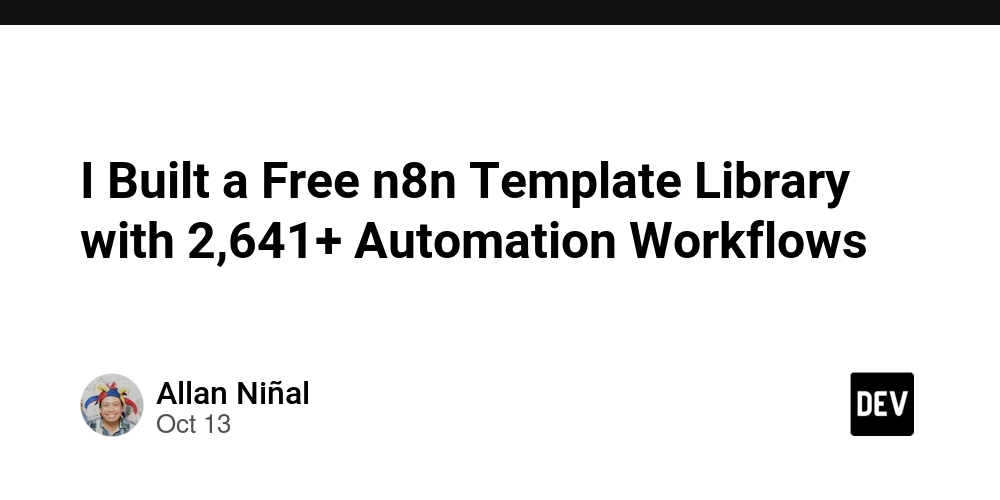If you’re into workflow automation, you’ve probably heard of n8n – the powerful open-source workflow automation tool. After working with n8n for a while, I realized there was a gap: finding quality templates was time-consuming and scattered across different sources.
So I decided to solve this problem by creating a centralized, free template library. Here’s how I built it.
🎯 The Problem
n8n is incredibly powerful, but starting from scratch can be daunting. While the official n8n community has templates, they’re not always easy to discover or filter. I wanted to create something that:
- ✅ Makes templates easy to discover with powerful search and filters
- ✅ Provides instant downloads with no registration required for individual templates
- ✅ Offers high-quality SEO so people can find solutions via Google
- ✅ Includes detailed documentation for each template
- ✅ Supports monetization through optional bundle purchases
🛠️ Tech Stack
I chose modern, scalable technologies that could handle growth:
Frontend
- Next.js 15.5.1 with App Router (React 19)
- TypeScript for type safety
- Tailwind CSS + Radix UI for beautiful, accessible components
- shadcn/ui component library
- Lucide Icons for consistent iconography
Backend & Database
- Supabase (PostgreSQL) for database and auth
- Supabase Storage for template files
- PayPal SDK for bundle purchases
SEO & Analytics
- Google Analytics 4 for tracking
- Google Tag Manager for tag management
- Google AdSense for monetization
- JSON-LD structured data for rich search results
- Dynamic sitemap generation
- Custom robots.txt with AI crawler support
Development Tools
- Playwright for E2E testing
- ESLint for code quality
- Git for version control
🏗️ Key Features
1. Comprehensive Template Library
The heart of the platform is 2,641+ curated n8n workflow templates across multiple categories:
- 🤖 AI & Machine Learning – GPT integrations, image processing, text analysis
- 💼 Business Automation – CRM, invoicing, reporting, lead management
- ⚙️ Automation – Workflow automation, task scheduling, data sync
- 📊 Data Processing – ETL, data transformation, analytics
- 📧 Email – Marketing automation, lead nurturing
- 💬 Messaging – Slack, Discord, WhatsApp integrations
- 🔗 API Integration – REST APIs, webhooks, custom integrations
// Example: Fetching templates from Supabase
const { data: templates } = await supabase
.from('templates')
.select('*')
.eq('category', category)
.order('created_at', { ascending: false })
.limit(24)
2. Powerful Search & Filtering
Users can filter by:
- Category (AI, Business, Automation, etc.)
- Difficulty (Beginner, Intermediate, Advanced)
- Popularity (90+, 80-89, 70-79)
- Date Added (Last 7/30/90 days)
- Search query (title and description)
// Client-side filtering with useMemo for performance
const filteredTemplates = useMemo(() => {
return templates.filter((template) => {
const matchesSearch =
searchQuery === '' ||
template.title.toLowerCase().includes(searchQuery.toLowerCase()) ||
template.description.toLowerCase().includes(searchQuery.toLowerCase())
const matchesCategory =
selectedCategories.length === 0 ||
selectedCategories.includes(template.category)
// ... more filters
return matchesSearch && matchesCategory && matchesDifficulty
})
}, [templates, searchQuery, selectedCategories, selectedDifficulty])
3. Email Capture Modal with Smart UX
Instead of forcing users to register, I use an ethical email capture approach:
- Users can browse freely
- Email is only requested when downloading
- Beautiful modal with template preview
- Success state with download link
- Optional bundle upgrade CTA
export function EmailCaptureModal({
templateName,
templateSlug,
templateImage,
onSuccess,
}: EmailCaptureModalProps) {
const handleSubmit = async (e: React.FormEvent) => {
e.preventDefault()
// Save email to Supabase
await supabase.from('subscribers').insert([{
email,
template_slug: templateSlug
}])
// Track download
await supabase.from('template_downloads').insert([{
template_slug: templateSlug
}])
// Generate download URL
const downloadUrl = `/api/download/${templateSlug}`
onSuccess(downloadUrl)
}
return (
<Dialog>
{/* Beautiful modal UI */}
</Dialog>
)
}
4. Advanced SEO Implementation
I built a comprehensive SEO system to ensure templates are discoverable:
Dynamic Metadata Generation
// lib/seo.ts
export function generateSEO(config: SEOConfig): Metadata {
return {
title: config.title,
description: config.description,
keywords: config.keywords,
openGraph: {
title: config.title,
description: config.description,
images: [config.ogImage || defaultOGImage],
type: config.ogType || 'website',
},
twitter: {
card: 'summary_large_image',
title: config.title,
description: config.description,
images: [config.ogImage || defaultOGImage],
},
alternates: {
canonical: `${SITE_URL}${config.canonical}`,
},
}
}
JSON-LD Structured Data
// Template schema for rich search results
export function generateTemplateLD(template: any): string {
return JSON.stringify({
'@context': 'https://schema.org',
'@type': 'SoftwareApplication',
name: template.name,
description: template.description,
applicationCategory: 'BusinessApplication',
operatingSystem: 'Cross-platform',
offers: {
'@type': 'Offer',
price: '0',
priceCurrency: 'USD',
},
aggregateRating: template.rating ? {
'@type': 'AggregateRating',
ratingValue: template.rating,
ratingCount: template.ratingCount,
} : undefined,
})
}
Dynamic Sitemap
// app/sitemap.ts
export default async function sitemap(): Promise<MetadataRoute.Sitemap> {
const { data: templates } = await supabase
.from('templates')
.select('slug, updated_at')
const templateUrls = templates?.map((template) => ({
url: `${SITE_URL}/templates/${template.slug}`,
lastModified: new Date(template.updated_at),
changeFrequency: 'weekly' as const,
priority: 0.8,
})) || []
return [
{
url: SITE_URL,
lastModified: new Date(),
changeFrequency: 'daily',
priority: 1,
},
...templateUrls,
]
}
AI Crawler Support
// app/robots.ts
export default function robots(): MetadataRoute.Robots {
return {
rules: [
{
userAgent: '*',
allow: '/',
disallow: ['/api/', '/admin/'],
},
{
userAgent: ['GPTBot', 'Claude-Web', 'PerplexityBot', 'Google-Extended'],
allow: '/',
crawlDelay: 1,
},
],
sitemap: `${SITE_URL}/sitemap.xml`,
}
}
5. Bundle Purchase System
Users can download individual templates for free, or purchase the entire collection:
- PayPal integration for secure payments
- $14.99 one-time payment for all 2,641 templates
- Instant access via download token
- Email delivery of download link
- Purchase tracking in Supabase
// app/api/paypal/capture-order/route.ts
export async function POST(req: Request) {
const { orderId, email } = await req.json()
// Capture PayPal payment
const capture = await capturePayPalOrder(orderId)
if (capture.status === 'COMPLETED') {
// Generate download token
const token = crypto.randomUUID()
// Save purchase to database
await supabase.from('purchases').insert([{
email,
order_id: orderId,
download_token: token,
amount: 14.99,
}])
return NextResponse.json({
success: true,
downloadToken: token
})
}
}
6. Template Rating System
Users can rate templates they’ve tried:
// Database trigger for auto-updating average ratings
CREATE OR REPLACE FUNCTION update_template_ratings()
RETURNS TRIGGER AS $$
BEGIN
UPDATE templates
SET
average_rating = (
SELECT AVG(rating)::numeric(3,2)
FROM template_ratings
WHERE template_id = NEW.template_id
),
rating_count = (
SELECT COUNT(*)
FROM template_ratings
WHERE template_id = NEW.template_id
)
WHERE id = NEW.template_id;
RETURN NEW;
END;
$$ LANGUAGE plpgsql;
📊 Database Schema
Here’s the core schema in Supabase:
-- Templates table
CREATE TABLE templates (
id UUID PRIMARY KEY DEFAULT uuid_generate_v4(),
title TEXT NOT NULL,
slug TEXT UNIQUE NOT NULL,
description TEXT,
category TEXT NOT NULL,
difficulty TEXT,
thumbnail TEXT,
file_url TEXT,
nodes INTEGER,
downloads INTEGER DEFAULT 0,
average_rating NUMERIC(3,2),
rating_count INTEGER DEFAULT 0,
features TEXT[],
created_at TIMESTAMPTZ DEFAULT NOW(),
updated_at TIMESTAMPTZ DEFAULT NOW()
);
-- Subscribers table
CREATE TABLE subscribers (
id UUID PRIMARY KEY DEFAULT uuid_generate_v4(),
email TEXT NOT NULL,
template_slug TEXT,
subscribed_at TIMESTAMPTZ DEFAULT NOW()
);
-- Template downloads tracking
CREATE TABLE template_downloads (
id UUID PRIMARY KEY DEFAULT uuid_generate_v4(),
template_slug TEXT NOT NULL,
downloaded_at TIMESTAMPTZ DEFAULT NOW()
);
-- Template ratings
CREATE TABLE template_ratings (
id UUID PRIMARY KEY DEFAULT uuid_generate_v4(),
template_id UUID REFERENCES templates(id),
rating INTEGER CHECK (rating >= 1 AND rating <= 5),
created_at TIMESTAMPTZ DEFAULT NOW()
);
-- Purchases table
CREATE TABLE purchases (
id UUID PRIMARY KEY DEFAULT uuid_generate_v4(),
email TEXT NOT NULL,
order_id TEXT UNIQUE NOT NULL,
download_token TEXT UNIQUE NOT NULL,
amount NUMERIC(10,2) NOT NULL,
purchased_at TIMESTAMPTZ DEFAULT NOW()
);
🎨 UI/UX Highlights
Responsive Design
- Mobile-first approach
- Sticky navigation and filters
- Smooth animations and transitions
- Dark mode support (via next-themes)
Performance Optimizations
- Image optimization with Next.js Image
- Lazy loading for template cards
- Pagination with “Load More”
- Client-side filtering with useMemo
Accessibility
- Radix UI primitives (fully accessible)
- Proper semantic HTML
- Keyboard navigation support
- ARIA labels and roles
🚀 Deployment
The project is deployed on Vercel for optimal Next.js performance:
// vercel.json
{
"buildCommand": "npm run build",
"framework": "nextjs"
}
Environment variables needed:
NEXT_PUBLIC_SUPABASE_URL=your_supabase_url
NEXT_PUBLIC_SUPABASE_ANON_KEY=your_supabase_key
NEXT_PUBLIC_PAYPAL_CLIENT_ID=your_paypal_client_id
PAYPAL_CLIENT_SECRET=your_paypal_secret
NEXT_PUBLIC_SITE_URL=https://yourdomain.com
📈 Results & Metrics
After launching:
- 2,641+ templates available for free download
- Multiple categories with smart filtering
- SEO-optimized pages for organic discovery
- Email subscribers growing steadily
- Bundle purchases providing sustainable revenue
- Fast performance with Next.js 15 and Vercel
🔮 Future Enhancements
Here’s what I’m planning next:
- User Authentication – Allow users to save favorites and build collections
- Template Submissions – Accept community template submissions
- Advanced Analytics – Track which templates are most popular
- Template Versioning – Support multiple versions of templates
- API Access – Programmatic access to templates
- Template Testing – Automated testing of template validity
- Video Tutorials – Step-by-step setup guides
- Discussion Forum – Community support and discussions
💡 Key Learnings
1. SEO is Critical
Investing time in proper SEO infrastructure paid off immediately. JSON-LD structured data and dynamic sitemaps make the site highly discoverable.
2. User Experience > Features
Keeping the download flow simple (just email, no account required) significantly improved conversion rates.
3. Next.js 15 App Router is Powerful
Server components, streaming, and the new metadata API make building modern web apps a breeze.
4. Supabase is Developer-Friendly
The combination of PostgreSQL, realtime subscriptions, and storage in one platform accelerated development.
5. Ethical Monetization Works
Offering individual templates for free while selling a bundle creates a win-win situation.
🎓 Code Examples for You
Want to implement similar features? Here are some reusable patterns:
Email Validation with Zod
import { z } from 'zod'
const emailSchema = z.object({
email: z.string().email('Please enter a valid email address')
})
const validateEmail = (email: string) => {
try {
emailSchema.parse({ email })
return { valid: true }
} catch (error) {
return { valid: false, error: error.errors[0].message }
}
}
Debounced Search
import { useState, useEffect } from 'react'
function useDebounce<T>(value: T, delay: number): T {
const [debouncedValue, setDebouncedValue] = useState<T>(value)
useEffect(() => {
const handler = setTimeout(() => {
setDebouncedValue(value)
}, delay)
return () => clearTimeout(handler)
}, [value, delay])
return debouncedValue
}
// Usage in search
const [searchQuery, setSearchQuery] = useState('')
const debouncedSearch = useDebounce(searchQuery, 300)
Loading States
function TemplateGrid({ templates, loading }: Props) {
if (loading) {
return (
<div className="grid grid-cols-1 md:grid-cols-2 lg:grid-cols-3 gap-6">
{Array.from({ length: 6 }).map((_, i) => (
<SkeletonCard key={i} />
))}
</div>
)
}
return (
<div className="grid grid-cols-1 md:grid-cols-2 lg:grid-cols-3 gap-6">
{templates.map(template => (
<TemplateCard key={template.id} template={template} />
))}
</div>
)
}
🌟 Conclusion
Building this n8n template library has been an incredible learning experience. The combination of modern technologies, thoughtful UX, and comprehensive SEO has created a valuable resource for the automation community.
The site is live at n8n.dailyaicollection.net – check it out and let me know what you think!
Want to Build Something Similar?
The key principles that made this project successful:
- Solve a real problem – Templates were scattered and hard to find
- Keep it simple – No unnecessary registration friction
- Optimize for discovery – Comprehensive SEO from day one
- Provide value first – Free individual downloads build trust
- Sustainable monetization – Optional bundle purchase for power users
🔗 Links
💬 Let’s Connect
What automation workflows would you like to see? Have suggestions for the platform? Drop a comment below or reach out!
If you found this helpful, please consider:
- ⭐ Starring the project
- 💬 Sharing with your network
- ☕ Supporting on Ko-fi
Happy automating! 🚀
Built with ❤️ by the Daily AI Collection team



